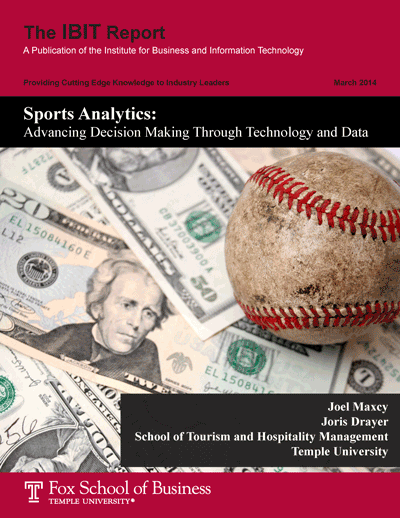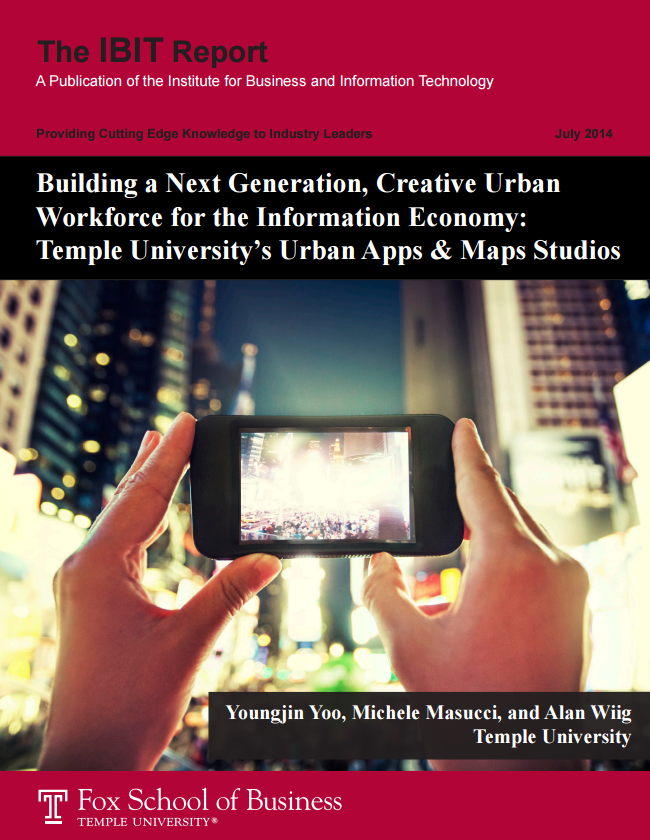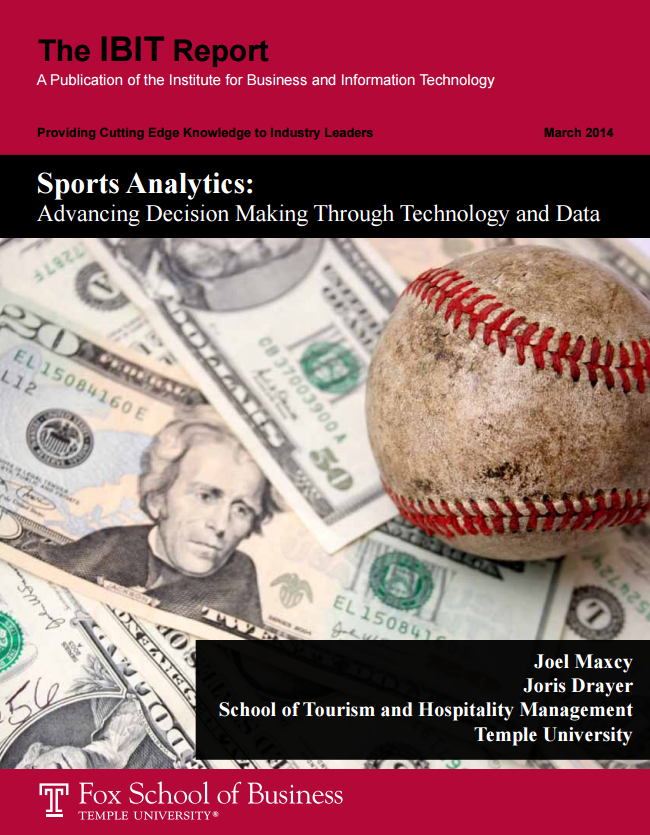![]() The Institute for Business and Information Technology (IBIT) is pleased to announce the release of The IBIT Report – Building the Next Generation, Creative Urban Workforce for the Information Economy authored by Youngjin Yoo, Michele Masucci, and Alan Wiig, Temple University.
The Institute for Business and Information Technology (IBIT) is pleased to announce the release of The IBIT Report – Building the Next Generation, Creative Urban Workforce for the Information Economy authored by Youngjin Yoo, Michele Masucci, and Alan Wiig, Temple University.
Building a Next Generation, Creative Urban Workforce for the Information Economy: Temple University’s Urban Apps & Maps Studios
Youngjin Yoo, Michele Masucci, and Alan Wiig
Temple University
July 2014
The transition of many US cities from an economy focused on manufacturing to one focused on digital and information technology has contributed to the decline of many inner-city neighborhoods. The impact of this change has not been evenly distributed across the labor market and the disparity has affected urban, minority communities disproportionately. Philadelphia is an example of this imbalance. In response to this problem, Temple University launched an interdisciplinary, university-wide initiative in 2012 called Urban Apps & Maps Studios Program. The program’s goal is to cultivate design-based and civic minded start-ups that will foster sustainable economic renewal in the North Philadelphia neighborhoods surrounding Temple University. This IBIT report details the drivers of the economic decline and impact on Philadelphia, the origination and development of the program, examples of the program’s success, and the program’s potential and applicability to other urban communities.
Harness the city as a platform for entrepreneurial-led community development.
© 2014 The IBIT Report, Institute for Business and Information Technology, Fox School of Business, Temple University, Philadelphia, PA 19122, USA. All rights reserved. ISSN 1938-1271.
Sports Analytics: Advancing Decision Making Through Technology and Data
 The Institute for Business and Information Technology (IBIT) is pleased to announce the release of The IBIT Report – Sports Analytics: Advancing Decision Making Through Technology and Data authored by Joel Maxcy and Joris Drayer, School of Tourism and Hospitality Management, Temple University.
The Institute for Business and Information Technology (IBIT) is pleased to announce the release of The IBIT Report – Sports Analytics: Advancing Decision Making Through Technology and Data authored by Joel Maxcy and Joris Drayer, School of Tourism and Hospitality Management, Temple University.
As advanced analytical techniques become more and more integrated into the world of sports, a mounting number of teams are using analytics to inform their management, player development, training methods, practice schedules, and more. The report deconstructs the history of these techniques, and assists its readers in applying data techniques to their own fields.
“This report was designed to be a fun read because it has appeal to a broader audience,” noted co-author Joris Drayer. “I think this is why [the film] Moneyball was such a popular story.”
Artfully expounding on an exciting “analytics revolution,” the report demonstrates how the application of analytics in sports applies to other domains, as well. “Organizations in any industry can use data to make decisions about Human Resources (i.e. players or employees) and Marketing (i.e. pricing or market segmentation),” Drayer added.
This in-depth look into the world of data demonstrates the importance of technological innovations, the growing influence of Big Data, and the competitive advantage analytics can provide to sports organizations worldwide.
“We enjoyed putting this report together,” said co-author Maxcy. “Analytics is rapidly advancing decision-making capabilities in sports. The effective use of data can be a real game changer.”
The ongoing IBIT Report series is based on rigorous, vendor-neutral academic research that provides actionable knowledge on topics relevant to industry partners.
—Felicia Roy
Sports Analytics: Advancing Decision Making Through Technology and Data
Joel Maxcy and Joris Drayer
School of Tourism and Hospitality Management, Temple University
March 2014
Sports enthusiasts are likely familiar with the growing importance of analytics in sports franchise operations. Sports teams use analytics in a wide range of activities, including game management, player development, marketing, and finance. As a result, sports are becoming a proving ground for tomorrow’s business analytics technologies. This IBIT Report provides a history and the current state of analytics and big data in sports. It includes two case studies that detail specific applications, their value, and the potential benefits to other industries. Also, the report outlines lessons learned to assist readers in applying these techniques to their own organization or field.
Industries with similar dynamics, including fixed capacity and on-place, time specific consumption, could learn a great deal from the sports industry.
© 2014 The IBIT Report, Institute for Business and Information Technology, Fox School of Business, Temple University, Philadelphia, PA 19122, USA. All rights reserved. ISSN 1938-1271.
MATTHEW GILLIN
INFORMATION TECHNOLOGY INNOVATOR AWARD
Matt is the CEO of Relay, where he is responsible for guiding the company’s strategy and overseeing the day-to-day operations. Matt has been an active entrepreneur and pioneer for nearly 20 years, and has been widely recognized for turning innovative ideas into successful businesses.
Most recently, Matt served as the CEO for Ecount, Inc., a company he cofounded in his parent’s basement with his friend Paul Raden. Together, they built Ecount into a recognized leader in the prepaid card industry. In 2007, they sold the company to Citi, and were successful in delivering considerable value to their investors and shareholders.
Following the sale, Matt remained as CEO of the renamed business (Citi® Prepaid Services) until 2009. In those two years, Matt and his team were responsible for establishing Citi as the world’s first truly global prepaid solution provider. Upon his departure, Citi Prepaid Services was issuing more than 40 million cards per year for over 2,000 clients, and delivering solutions in more than 40 countries across the United States, Europe, Africa and Asia.
Matt is widely regarded as an innovator. He holds three patents in the US patent office for his inventions, and is a multiple award-winning executive. In 2002, Matt won the Ernst & Young Entrepreneur of the Year Award®. In 2004, he was named one of the Philadelphia region’s most influential executives under the age of 40. In 2006, the Eastern Technology Council named Matt the CEO of the Year. In 2007, he was awarded the Walter M. Aikman Entrepreneur of the Year Award. And in 2013, he was named IT Innovator of Excellence at the 20th Annual Enterprise Awards. Matt holds a B.A. from Denison University.






